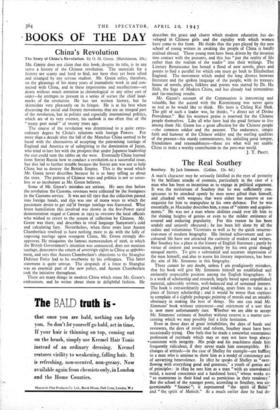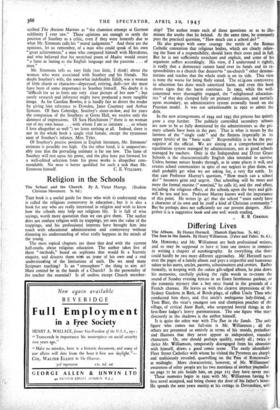The Real Southey
Southey. By Jack Simmons. (Collins. 12s. 6c1.).
A MAN'S character may be seriously falsified in the eyes of posterity by the brilliant attacks of enemies, particularly. in the .case of a man who has been so incautious as to engage in political argument. It was the misfortune of .Southey that he was sufficiently con- spicuous to be attacked openly by men more gifted than himself, and attacked with weapons that were- either too- massive or too exquisite for him to manipulate in his own- defence. For he was essentially, as Macaulay describes him, a man of "talents and acquire- ments?' He was not a man whose abilities could ever lift him to the shining heights of genius or even to the milder eminence of assured and enduring popularity. For this reason he has been unduly and unjustly obscured ; he has been left alone by all the sedate and voluminous Victorians as well as by the quick resurrec- tion-men of modern biography. His limited achievement and un- coloured life have not attracted the curiosity of readers and writers. But Southey has a place in the history of English literature ; partly by virtue of context and association, partly by his own great though unequal merits. To give a substantial and accurate impression of the man himself, and.also to assess his literary importance, has been the aim of Mr. Simmons in this biography.
There cannot be any doubt, unless I am prodigiously mistaken, that his book will give Mr. Simmons himself an established and eminently respectable position among the English biographers. It is a work of scholarship and research, largely based upon unpublished material, admirably written, well-balanced and.of sustained interest. The book is extraordinarily gtiod reading, apart from its value as a piece of literary scholarship ; and it would be worse than captious to complain of a slightly pedagogic pointing of morals and an amiable obstinacy in making the best of things. No one can read Mr. Simmons' book without enjoyment—and enjoyment of a sort that is now most unformnately. rare. Whether' we are able to accept Mr. Simmons' estimate of Southey without reserve is a matter con- cerning which we may possibly feel a little hesitation.
Even in those days of great irritabilities, the days of bards and reviewers, the days of revolt and reform, Southey must have been occasionally trying. One feels that he made a Somewhat ostentatious profession of rectitude which may or may not have been always ...consistent with integrity. His pride and his touchiness made him frequently ridiculous, if they never made him contemptible. His changes of attitude—in the case of Shelley for example—are baffling to a man who is anxious to show him as a model of consistency and of unvarying benevolence. In au he speaks of Shelley as "over- flowing with everything good and generous," a youth of genius and of principles : in 182o he sees him as a man " with an unawakened mind, a seared conscience and a hardened heart," whose works are " so monstrous in their kind and so pernicious in their tendency." But the school of the younger poets, according to Southey, was un- questionably " Satanic "; it represented " the spirit of Belial " and " the spirit of Moloch." At a much earlier date he had de-
scribed The Ancient Mariner as "the clumsiest attempt at German sublimity I ever saw." These opinions are enough to settle the
position of Southey as a critic, even if they were honestly due to
what Mr. Simmons calls his " moral judgement." And these are the opinions, let us remember, of a man who could speak of his own " great achievement," a man who compared himself with Hercdotus, and who believed that his wretched poem of Madoc would secure
"a fame as lasting as the English language and the passions . . . of man."
Mr. Simmons tells us very little (too little, I think) about the women who were associated with Southey and his friends. No doubt Southey's wife, the somewhat indefinable Edith, was a woman of little charm or character—depressed, retiring, dull—yet she must have been of some importance to Southey himself. No doubt it is "difficult for us to form any very clear picture of her now " ; but surely research and inference might have produced a more tangible image. As for Caroline Bowles, it is hardly fair to divert the reader by giving him reference to Dowden, Janet Courtney and Arthur Symons. Of Sara Coleridge, Southey's sister-in-law, and for years the companion of the Southeys at Greta Hall, we receive only the dimmest of impressions. Of Sara Hutchinson (" there is no woman out of my own house .. . with whom I am so intimate .. . or whom I love altogether so well ") we learn nothing at all. Indeed, there is not in the whole book a single vital female, except the tyrannous aunt of Southey's infancy, Miss Tyler.
Of Southey's precise position in English literature, Mr. Simmons' estimate is possibly too high. On the other hand, it is unquestion- ably true that the prevailing estimate is far too low. The fame of Southey will rest upon his prose, and the plea here put forward for a well-edited selection from his prose works is altogether com- mendable. No man is better qualified for such a task than Mr.



























 Previous page
Previous page